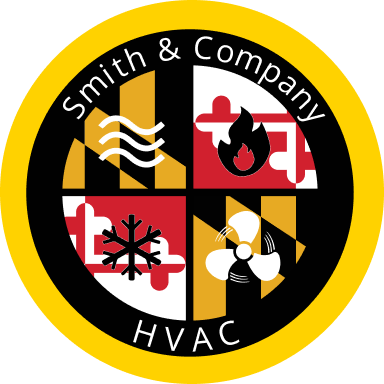FAQs
Frequently Asked Questions About HVAC Systems
Frequently Asked Questions About HVAC Systems
As a leading HVAC company in Maryland, Smith & Company HVAC is dedicated to ensuring that our clients receive the best value from their HVAC systems. While a large part of our work revolves around HVAC service and repairs, we also strive to provide our clients with clear, accurate, and helpful information.
Below, we’ve compiled answers to some of the most common questions our HVAC technicians receive.
FAQs
How Often Should I Clean or Replace My Air Filters?
Air filters should be replaced or cleaned at least once per month. This will ensure optimal filtration and help you achieve the best efficiency from your HVAC system.
How Often Should I Have My HVAC System Serviced?
It’s best to schedule HVAC service twice per year – each fall and spring, at the beginning and end of daylight savings time. While it’s essential to have your entire system checked each year, AC maintenance is especially important in the spring, and heating system service is critical in the fall. Regular inspections and upkeep will help prevent serious problems down the road.
How Do I Know When to Repair or Replace My HVAC System?
There are several indicators that your HVAC system may need repairs. If you notice that your HVAC equipment isn’t keeping your home as comfortable as it did before, reach out to a professional for an inspection. You should also watch out for pooling water when your AC unit is running, cold air coming from your furnace, and unusual spikes in your utility costs.
How Can I Save Money on My Energy Costs?
While energy bills are often pricey during particularly cold or hot months, there are several things you can do to save money. First, you should select an HVAC system with a high Seasonal Energy Efficiency Ratio (SEER) rating. You can also install ceiling fans, which circulate the air inside your home or business. This often allows you to turn the thermostat up a few degrees in the summer, reducing your air conditioning costs. Finally, you should seal all of your windows and doors to prevent drafts. Making sure your home has adequate insulation is an effective way to lower your utility bills.
How Long Do HVAC Systems Last?
Many factors affect the general lifespan of a heating or air conditioning system. Of course, the more you keep up on HVAC maintenance, the more likely your system is to achieve its maximum lifespan. The make and model of your equipment can also determine how long it will last. Generally speaking, a well-maintained HVAC system can be expected to remain effective for about 15 to 20 years.
Why Is There a Burning Smell When I Turn on My Furnace for the First Time?
The simple answer to this question is dust and dirt. As your furnace sits idle over the warmer months, dust and airborne dirt particles settle on its elements. When the weather cools and you ignite your furnace for the first time, the dust burns and creates the unpleasant odor you are experiencing. Luckily, you can avoid this situation by contacting trusted HVAC contractors who can clean and inspect your system before winter use.
What Are the Troubleshooting Steps in HVAC?
While HVAC problems often demand assistance from a professional, homeowners can diagnose several simple issues on their own. Before you call up a local HVAC company, complete the following troubleshooting steps:
- Check Your Thermostat Settings – Incorrect thermostat settings can greatly influence your HVAC system’s performance. So, if you notice that your heating or cooling equipment isn’t working as effectively as it usually does, be sure to look at your thermostat first.
- Clean Your Air Filters – Be sure to change your air filters frequently, as clean filters can help with air circulation and speed up the cooling or heating of the home.
- Check Your Home’s Sealing – Poor sealing around windows and doors allows cold or warm air to escape your home. Addressing these issues can improve airflow and help your HVAC system work more efficiently.
- Inspect Your Pilot Light and Electrical Components – If you’re having trouble starting your HVAC system, there’s likely a problem with the pilot light or another electrical component. However, you’ll need a professional to replace these parts if necessary.
We hope this Q&A will help resolve any HVAC issues you may be facing. If you need further assistance, contact Smith and Co HVAC at (410) 972-9343 or via our online contact form.
